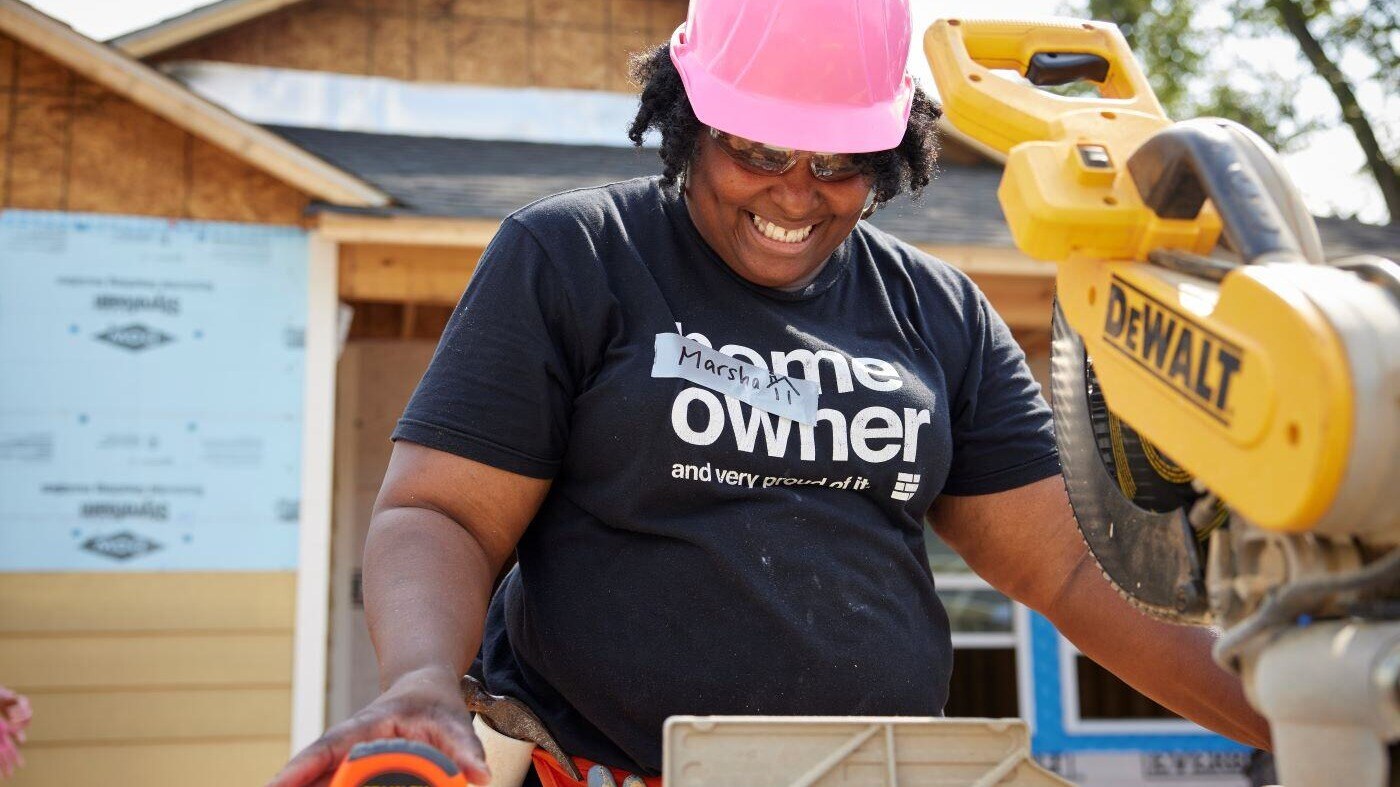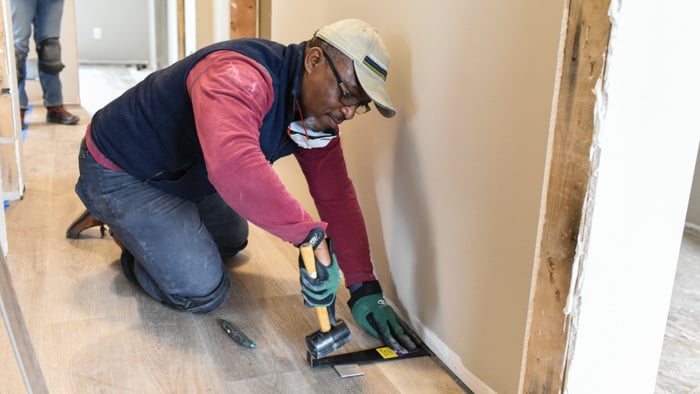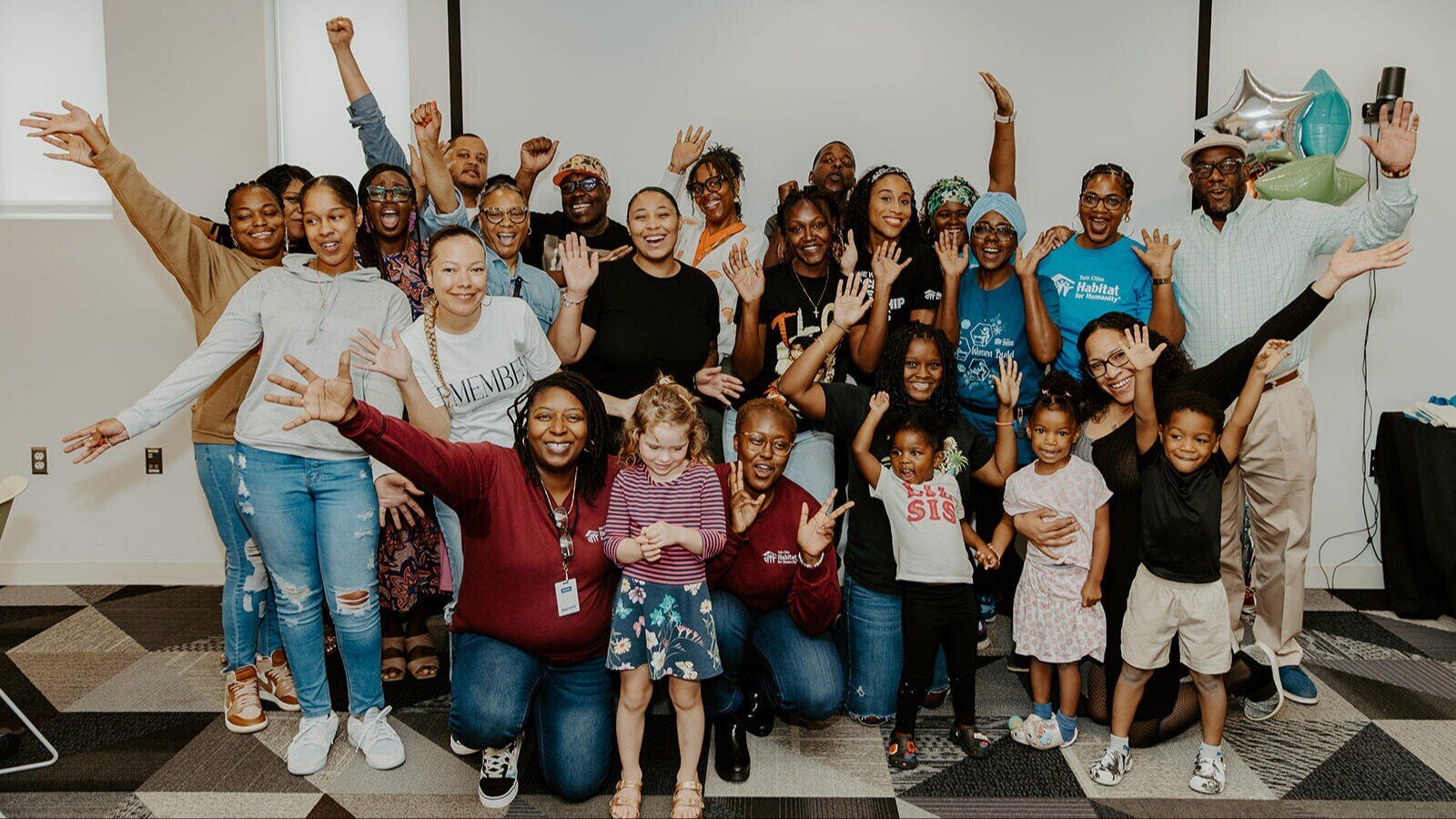Years After Buying His Habitat Home, Edgar Still Loves to Volunteer
In early 2024, Twin Cities Habitat for Humanity launched an innovative new program for Habitat homeowners called Volunteer and Learn. This program...
5 min read
 Blake MacKenzie
:
1:25 PM on May 30, 2024
Blake MacKenzie
:
1:25 PM on May 30, 2024

Habitat for Humanity International was founded in 1976 on the concept of “partnership housing,” where those in need of shelter worked side-by-side with volunteers to build decent, affordable homes. This concept has remained a key component of Habitat’s mission. It’s intended to ensure Habitat homebuyers are set up for success in homeownership and has helped create the large, vibrant, and generous Habitat community we have today.
Over time, the ethos of partnership housing evolved into “Sweat Equity,” a requirement that homebuyers spend a set number of hours working on their home, the home of another family, or contributing in some other way to Habitat’s mission. The intention of Sweat Equity is to demonstrate the homebuyer’s willingness to partner with Habitat—but the impact on homebuyers hasn’t always been equitable.
Now, Twin Cities Habitat for Humanity has innovated to create a new vision of partnership housing grounded in our mission to advance racial equity in housing. We have eliminated the one-size-fits-all Sweat Equity requirement for homebuyers to complete a set number of construction hours and have launched a new client-centered program called Volunteer and Learn with Habitat.
The Volunteer and Learn program preserves and enhances the best intentions of Sweat Equity: education for success and stability in homeownership, community building, and creating a sense of pride for homeowners. And, significantly, it removes a barrier to achieving homeownership for our clients. After all, we’re working to create and expand pathways to homeownership, not block them.

To understand how we got here today, we need to go back. Way back—to before Habitat for Humanity was founded. And that’s because racial equity is deeply embedded in Habitat’s DNA.
The idea for Habitat for Humanity came out of Koinonia Farm in rural Georgia during segregation—a place where Black and white folks lived together, ate together, were paid equally, and created a community together. Because of their commitment to racial equity in the 1950s and 60s, Koinonia farm was a target of the KKK. They suffered economic boycotts, violence, and even bombings. Still, they were not deterred from their vision of a radically inclusive community. A commitment to racial equity is in our roots, and we carry it with us today.

Black and white folks living and working side-by-side at Koinonia Farm.
For the last 10+ years, Twin Cities Habitat for Humanity has been on an organization-wide journey with advancing racial equity and affordable housing. Propelled by Minnesota’s worst-in-the-nation racial disparities in homeownership rates and compelled by our founding in a place of radical inclusivity, we have deepened our commitment to advancing racial equity in housing. That means we want to ensure all our programs and policies are racially equitable with our homeowner partners at the center.
When the COVID-19 pandemic began, Twin Cities Habitat waived the requirement that folks buying Habitat-built homes complete 100 Sweat Equity volunteer hours. Our top priority was to ensure families remained healthy and stable during an incredibly stressful time. This provided an opportunity for us to step back and take a deep look at this policy through a lens of racial equity.
A cross-departmental team at Twin Cities Habitat was charged with examining the Sweat Equity policy to determine the intention and impact of the requirement, as well as who benefits, who is burdened, and if it aligns with our values. After significant stakeholder research – including surveys, focus groups, and interviews with homeowners, staff, and volunteers – we’ve determined that our historic Sweat Equity policy is not equitable and creates an unnecessary barrier to homeownership.
This program had good intentions to create connections between clients and volunteers, offer skill-building opportunities for homebuyers, and help homebuyers feel a sense of pride in building their own home. And almost every homeowner we talked to shared that the Sweat Equity hours had done exactly that for them—there were many positives in the experience.
However, we learned that clients have also been burdened by the policy. To complete their Sweat Equity hours, many homebuyers have needed to take unpaid time off work, experience income loss, find childcare, and spend less time with their families. Through client feedback, we’ve identified that this burden falls the hardest on Black households—especially single Black moms. Finally, we heard that the term “Sweat Equity” held connotations with slavery and indentured servitude from several different stakeholders.

The chart above shows a racial disparity in responses from Twin Cities Habitat homeowners to the question "Did you have to take time off work to complete Sweat Equity hours?" The majority of white respondents didn't have to take time off work, but the majority of Black respondents did have to take time off—including almost 40% who had to take unpaid time off work.
We also learned that the Sweat Equity requirement kept some households from even applying for Habitat homeownership. Community members were familiar with the sweat equity policy and felt this barrier was just too high. With this information, we knew we needed to create a more equitable approach.
After eliminating the requirement for Habitat homebuyers to complete 100 hours of Sweat Equity before they could buy a home, our challenge was how do we carry forward the powerful ethos of partnership housing without this requirement? How do we keep the benefits of sweat equity without the burdens?
So, we asked the experts: Habitat homeowners and homebuyers. We asked what they wanted out of the experience—what they wanted to learn, what skills they wanted to build, and how they wanted to be plugged in to the Habitat community. The solution is a new client-centered program called Volunteer and Learn with Habitat. It features three types of events that are open to Habitat homebuyers and homeowners throughout the year: Skill Build events, Learn Together events, and Build Community events.
Again and again, our research indicated that the top benefit of Sweat Equity was building home maintenance skills. Skill Build events take place at build sites, and they give participants the chance to learn and practice skills like painting, flooring, or finishing trim alongside Twin Cities Habitat’s expert site supervisors. When possible, participants can also tour nearby completed Habitat homes and ask questions about maintenance challenges. These participants are gaining new skills and helping with construction of homes for future homebuyers.
Edgar bought his home with Habitat 14 years ago. When he saw the first Skill Build event on a Saturday in early 2024, he signed up right away. “There’s always, always, always something you can be doing to maintain your home,” Edgar says. And for Edgar, there’s no better way to learn than by doing it yourself with guidance from Habitat’s Site Supervisors.

Edgar working on flooring at Twin Cities Habitat's first Skill Build event.
Habitat homeowners also expressed the desire to keep learning. Learn Together events have more formal instruction that may be combined with volunteering. In April, our ReStore Home Improvement Outlet in Minneapolis hosted Blooms and Beyond, an event about preparing your yard for warmer weather. Other classes include topics like basic home maintenance skills, dealing with Homeowners Associations, financial management, home insurance, estate planning, introduction to the MN Tool Library, and more.

Former Habitat staff member Terry Barnes (right) teaches Habitat homeowners all about gardening and yard care at the "Blooms & Beyond" Learn Together event.
Finally, Habitat homebuyers and homeowners want to feel connected to the vibrant, big-hearted Habitat community. Build Community events facilitate connection with other homeowners and supporters to develop relationships to strengthen our communities. Several times a year we will host a big Home Celebration to welcome new Habitat homeowners to the community and let everyone meet, mingle, and have fun. And we’re intentionally inviting more Habitat homeowners to Habitat-wide events like our annual Habitat on the Hill advocacy day and Hard Hat & Black Tie Gala.
More than 375 people attended our May Home Celebration in the Harrison neighborhood of Minneapolis, just blocks away from our recently completed Harrison Townhomes project. The event featured a resource fair for homeowners, music and entertainment for the kids, and good food for everyone (photos below). Plus, the nearby townhomes were open to tour, so homeowners and supporters could see a completed home and dream of the possibilities for the next homebuyer family.
The Volunteer and Learn with Habitat program officially launched in early 2024, and we’ve been incredibly heartened by the positive response from the Habitat community—especially from Habitat homeowners and homebuyers. Twin Cities Habitat is the first Habitat affiliate (that we know of) to eliminate the Sweat Equity requirement and create an innovative new program. We’re proud to be a leader in this space, sparking important conversations across the Habitat network about making our program requirements more equitable. And none of this would’ve been possible without the dedicated group of Twin Cities Habitat staff who spent years doing the research, developing plans, and implementing this new program—thank you!
If you are a Habitat homeowner or you’re currently in Habitat’s Homeownership Program, we’d love to hear from you! Visit our Volunteer and Learn landing page and share the skills you’re interested in learning.

Homeownership with Habitat is not contingent upon any of these volunteer activities and in no way ensures that the client attains homeownership through Twin Cities Habitat for Humanity.
Your gift unlocks bright futures! Donate now to create, preserve, and promote affordable homeownership in the Twin Cities.

In early 2024, Twin Cities Habitat for Humanity launched an innovative new program for Habitat homeowners called Volunteer and Learn. This program...

Our Build Forward Together strategic plan is more than words on paper—it’s a bold vision for a vibrant, equitable Twin Cities community. This...

Twin Cities Habitat for Humanity has partnered with Framework Homeownership to launch a custom homebuyer education program tailored specifically for...